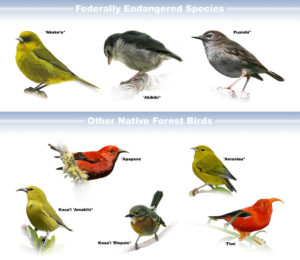
“We thought we had a little more time,” Dr. Lisa “Cali” Crampton said. Crampton is the project leader for the KFBRP. “ It’s happening right now. We’re losing birds.”
During the virtual event beginning at 4:30 p.m., Crampton will provide an update on her team’s recent findings on three federally listed species— ‘akikiki, puaiohi, and ‘akeke’e—and one threatened species – ʻiʻiwi.
These birds aren’t the first to face extinction on Kaua’i. University of Hawai’i Professor Emerita Sheila Conant will also be a panelist during the conversation, and she will talk about the 1970s before the extinction of kama’o, ‘o’o, and ‘o’u.
All native forest birds in Hawaiʻi are threatened now more than ever. Warming temperatures are allowing mosquitoes to survive at higher elevations, the last place of refuge for the famed honeycreepers of Hawai‘i. Mosquitoes are known to carry avian malaria and avian pox, diseases that are deadly to all native forest birds.
Teya Penniman from American Bird Conservancy will provide an update on “Birds, Not Mosquitoes” a multi-agency effort that uses a bacteria known as Wolbachia as a form of birth control for mosquitoes. The goal is to reduce mosquito populations to allow forest bird populations to rebound.
Rounding out the panel for June will be Kumu Kehaulani Kekua of Halau Palaihiwa O Kaipuwai. She will share the Hawaiian cultural relationships with birds in the sacred environment of the forest and how traditional practices ensured cycles of life, health, and well-being.
This is a unique opportunity to discover what is happening with forest conservation and cultural practices. People are encouraged to participate in the conversation by submitting questions during the event.
Anyone with an interest is welcome to join the conversation by attending the Zoom presentation. Registration is required or viewers can watch live on Facebook at the KISC or KFBRP pages. Previous Forest Friday presentations are there as well.
To help protect Kaua’i’s native forest birds, experts encourage:
1) Take measures to reduce your personal climate footprint.
2) Here on Kauai, avoid creating standing water sources in which mosquitoes breed.
3) Support measures like landscape mosquito control to reduce the spread of disease among the birds.
Register to participate:
http://bit.ly/kauaibirds.
Watch live:
facebook.com/kauaiisc or facebook.com/kauaiforestbirds
Learn more about Kaua’i’s native forest birds:
website https://kauaiforestbirds.org/ and sign up for the KFBRP mailing list https://kauaiforestbirds.org/mailing-list/